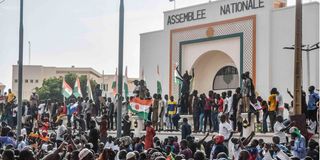Niger coup speeds up French fall-out in West Africa

Supporters wave Nigerien's flags as they rally in support of Niger's junta in front of the National Assembly in Niamey on July 30, 2023.
What you need to know:
- Niger had been independent from France for the past six decades but the French presence had been stronger in the economy, defence and other facets of the country.
When the Nigerian military seized power in July, deposing and detaining President Mohamed Bazoum, the condemnation was expected. Niger is now a suspended member of the African Union (AU) and the West African bloc, Ecowas.
But the French may have lost even more after the junta, led by 59-year-old General Abdourahamane Tchiani, declared a “liberation” from the colonial yoke. Niger had been independent from France for the past six decades but the French presence had been stronger in the economy, defence and other facets of the country.
Mali and Burkina Faso had, since 2020, led the campaign against France while Guinea, the other member General Abdourahamane Tchiani of the ‘coup belt’, had long cut off French influence.
When Niger’s military junta demanded that France recall its ambassador, Sylvain Itte, a month after a coup, French President Emmanuel Macron initially refused to do so.
In his annual speech to the country’s senior diplomats on August 8, Macron paid tribute to the French ambassador in the capital, Niamey, “who is staying put, despite the pressure” and “illegitimate declarations of authority” by Niger’s military leaders.
Niger did not expel the ambassador, but his diplomatic privileges were withdrawn before 1,500 French military personnel were shown the door and their equipment dismantled.
These actions destroyed relations between the two former allies.
Niger then embarked on a process of monetary and fiscal liberalisation that had been dominated by France since 1960, when the then colony gained independence.
According to Harold Dacosta, a political analyst in Niamey, the military coup in Niger orchestrated the empowerment of citizens to revolt against decades of French domination of Francophone African countries.
"The revolt against France and what it represents was spontaneous and unprecedented; as civilians dared French soldiers in their base in France, not minding the implications. The game was over for France, [regardless of the] handouts the country was getting from its master," he said.
France had been providing 40 per cent of Niger's budget support and was Niamey’s ally in the fight against insurgents in the Sahel region.
Gérard Araud, a diplomat who has worked in the United Nations, Washington and Israel, said: “We are witnessing a revolt of the youth” against both France and their national governments, which are seen as France’s puppets in the region.
According to him, the anger against the French is linked to a demographic boom and extreme poverty that has put a strain on national authorities.
"Nigeriens now believe France has had privileged access to the country's political elite and natural resources for too long. They see the coup as a chance for a clean slate, a way to get sovereignty back and be rid of French influence," said Alex Adama, an activist in Niamey.
“The army has never stayed in power long in Niger," Adama says, referring to the five coups that have rocked the country since 1960.
"The military will eventually return to its bases and hand over to a better civilian government that will lead Niger to its destiny," he adds.
In Niger, as is in Mali and Burkina Faso, the debate on insurgency in the Sahel revolves around blaming elected governments and their development partners for doing little. It also touches on the failure of the very juntas themselves to improve governance, which in turn fuels rebellion and terror merchants. This has fuelled a vicious cycle, including the recent coups in Mali.
Mali and Burkina Faso had also expelled French soldiers, but the disdain and revolt against France was not as mammoth as witnessed in Niger, said Prof Sam Ali, a rights activist on West Africa’s political scene.
“The people accused France of domiciling Niger’s currency reserves in France and dictating both the fiscal and monetary policies and profiting from it," he said.
Ali explained that the junta, in alliance with Mali and Burkina Faso, had begun implementing a "liberation" policy to free Niger from the fiscal, monetary, political and cultural stronghold.
Meanwhile, the Economic Community of West African States (Ecowas), had earlier imposed sanctions on the three countries to force them to restore democracy.
Niger's junta leader Tchiani announced in a television broadcast on December 9, 2023 that they were forming a monetary alliance with members of the 'coup belt', away from France, the traditional keeper of Niger's foreign and currency reserves.
They also decided to form a new union, the Alliance of Sahel States (AES), to avoid Ecowas, the region's main political and economic bloc.
They also discussed the creation of a joint stabilisation fund and investment bank, among other measures aimed at making the countries completely independent of both France and Ecowas.
Niger, the world's seventh largest uranium producer, has suspended exports of uranium and gold to France. France depends on Niger's uranium for about 15 per cent of the resources to fuel its nuclear power stations.
The confrontation has become so worrying that in August, some 94 French senators wrote to President Macron to express their disgust with his policies in Africa.
The letter, published by the French daily Le Figaro, said Macron's failures had sparked anti-French sentiment in Africa and fears that Russia and China had displaced France, a situation Macron should immediately review.
France may suspend its 40 per cent budget funding to Niger, but the EU's annual report said the European Commission's 503 million euros ($554 million) to improve governance, education and sustainable growth in Niger could keep the country afloat.
Meanwhile, Ecowas has officially recognised the junta in power in Niger, but said its sanctions to reverse the coup would remain in place for now as it initiates steps for a "short" period of transition to civilian rule.





